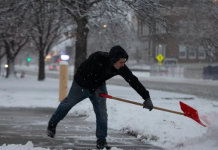“GLOBALIZATION IS EXPOSING NEW
FAULT LINES – BETWEEN URBAN
AND RURAL COMMUNITIES,
FOR EXAMPLE.”
Ban Ki-moon
With the increase of earthquakes, here in the heartland, it seems a good example to use to compare to what is happening in the rural areas of the country. Fault lines move and there is localized searching for what has caused the activity to happen. Same thing in the quakes in rural living.
To look at the big picture expands the recognition that there are many seemingly unrelated factors that have profound effects on what is happening outside our back door.
As the continuing seismic activity all around the world is happening almost on a daily basis it has to have a reaction further away from the shaking happening elsewhere. There are local factors that can influence the shaking but it takes someone smarter than me to place blame, especially when the planet is and always has been a dynamic world.
In the rural areas we have always had the disadvantage, or advantage, that many things are further away than what our counterparts in the urban areas have it. But when we do have some convenience it sometimes is more than that, it becomes a necessity.
There have been several rural communities that have been shocked that their Wal-Mart neighborhood stores are closing. The giant retailer, who has had the by product of closing down several local businesses when they move into an area, have found that the volume is not high enough for their standards. Big surprise!
St. John has had probably the biggest shock by the Dillon’s store announcing it is closing in their county seat town. Dillon’s who made their reputation by starting out in small town Kansas and growing into the super stores are no longer a local enterprise. Selling to the Kroger Corporation the decisions for how the business runs is now in Cincinnati instead of Hutchinson.
Like it or not as the standard theme of getting bigger always, there is a time that a small older store does not fit the profile that the group has. As usual it is the rural town and residents that will have to deal with the pull out.
The Kansas Sampler Foundation has been trying to address the challenges of the loss of small town grocery stores for several years. They have had many meetings bringing together a wide range of people to address the problem. You see there is a pattern of when a small town starts on a down turn. In most it has been happening for decades and many towns have just gone away.
There are several things that start the decline and even losing one hurts. Some can deal with the losses and some cannot. It starts, in no particular order, when a town loses it’s doctor, café, grocery store, high school, grade school, retail businesses, post office, filling station, and manufacturer/job producer.
We talk about supporting our communities and buying local. Many of these things that kill us are accelerated when people will not give some of their business to the local. But once the loss has happened that is not always a solution.
I hope that all these towns and rural areas come together to find solutions, also that the residents will also commit to supporting the solutions. There is an old adage that you “use it or lose it”. When I could travel more I love to stop and spend money in the small markets, cafes, and businesses. I want to give a little support so when I come back the business is still there.
I advise the communities facing these losses to use the available resources to find a good solution. Then admonish all parties to follow through on them.
We love living rural and we don’t expect a fire truck or ambulance on the corner, or even a paved road past our house. We sacrifice the convenience for having breathing room and a simpler way of life. We do expect some support from those who either have made a great deal servicing our needs or at least stay out so our local providers can continue to. Don’t tear down our way of life for simply a dollar. There are many other factors involved.





Thank you for this thoughtful consideration of the decline of or disappearance of small towns/communities. There are many pressures, not the least of the declining commitment of a state to support (subsidize) smaller communities due, apparently, to a lack of belief that small communities matter. Then, there is the issue of small town people wanting their small towns but instead of paying an extra dollar per gallon of milk in the small town, they seek best price wherever they can find it….generally in bigger towns at big box stores. We simply don’t walk the talk of small town/community value. Thus, we must not really value them.